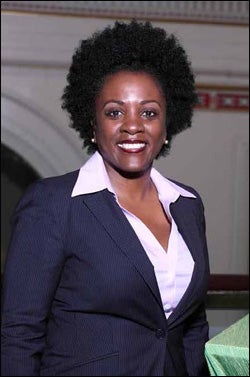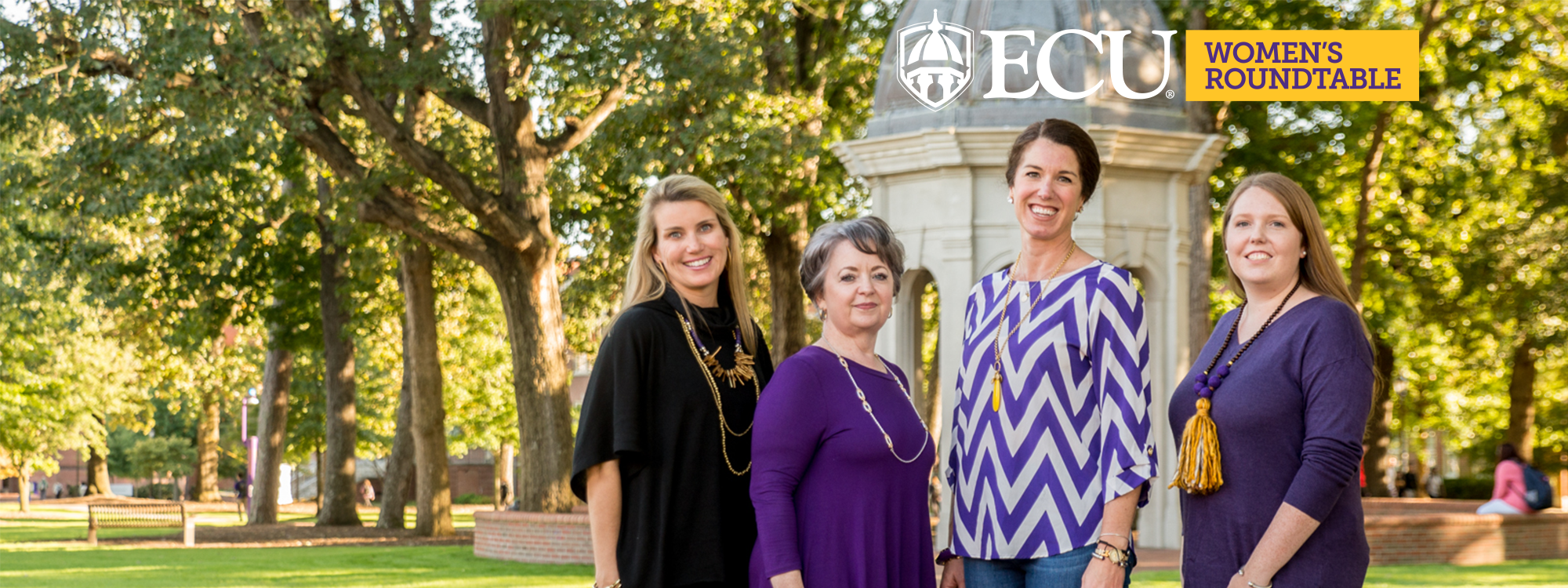Valeria Lassiter
Doing well by doing good
From EC Alumni
Summer 2014
Despite the ups and downs of the economy, one indicator continues to rise: charitable giving. People remain motivated to make a difference in society.

But this commitment to give has recently grown into a complex structure. Innovative media to engage donors, exciting new types of philanthropic events, a boom in new online giving technologies—with trends such as these, nonprofit fundraising needs sophisticated strategic planning like never before.
That’s where Valeria Lassiter ’90 and her business, Lassiter & Associates, can help. Her for-profit firm supports nonprofits in all areas of capacity building, fund development, and communications.
And just like the organizations she helps, Lassiter is there because she wants to make a difference. ECU provided an environment that nurtured her deep commitment to helping others.
“At ECU, I became aware that I could not simply have a job. I needed a vocation,” Lassiter says. “My classroom experiences in journalism, political science, and women’s studies strengthened my analytical skills and taught me a systematic process for collecting various voices and perspectives to inform decision making.”
Combining these ECU-honed analytical skills with an understanding of the value of diversity and inclusion encouraged by her early life, she developed her unique business niche: strategic and creative communications consulting to promote meaningful social change.
Accepting your vocation
Lassiter remembers her dismay when a high school principal returned the results of her career aptitude test: community service. “Where was the excitement in a field like that?” she wondered as a teen.
Years later, as she accepted a $1 million check from Oprah Winfrey for a client providing help for children with incarcerated parents, it was clear she could find plenty of excitement in community service.
What triggered the transition from resistance to success? Her ECU experience, she says, helped shape her positive view of community service. She entered the university as a cheerleader and her high school’s first African-American homecoming queen— and she was ready to work hard toward the glamorous goal of entrepreneurship or broadcast journalism.
But her parents—and the Johnston Piney Grove Missionary Baptist Church in Clayton—had planted the seeds for a life of social responsibility. These same seeds were then nurtured by tough but inspiring ECU professors—chief among them the late Dr. Gay Wilentz.
“It was the first time a teacher challenged me to take an active role in advancing social change,” she says. “Dr. Wilentz constantly reminded me of my social responsibility. She talked a great deal about what she called my ‘tri-dimensional’ reality of race, class, and gender. It gave me a greater understanding of myself in the broader society.
“It was at ECU that my social consciousness expanded, and I saw myself as a global citizen,” Lassiter says. She helped protest US involvement in South Africa during the apartheid era and imprisonment of Nelson Mandela.
She realized that there was more to communication than a talking head doing television commentary. Communication could be a tool for social change and strengthening communities. In a full circle she could never have predicted, more than 20 years later, her firm was hired to design and implement the 25th anniversary celebration of the US role in helping to end apartheid.
Skills translate into leadership
Lassiter’s ECU professors insisted she develop research skills and read a variety of news sources. She still continues that practice. “Learning to see subtleties and be open to other points of view has truly helped me in my career,” she says.
For instance, her first job out of college was as a public affairs specialist in Washington, DC. She designed and executed communication strategies to inform businesses and residents that sexual orientation would be a protected class under the Human Rights Act.
“The city was ahead of its time, and I’m proud to say that I was a part of that,” she says. “Living in the nation’s capital, you encounter competing viewpoints all the time. But to get anything accomplished, you have to gain agreement.”
Supporting mission-driven organizations
Acceptance of community service as a part of her professional life led Lassiter to pursue a master’s of divinity from Colgate Rochester Divinity School and to work in corporate philanthropy for the Marriott Foundation. But throughout, she never lost the drive to start her own business. So in 2003, she launched Lassiter & Associates.
Entrepreneurism wasn’t the easy option: Work can begin at 4:00 a.m. and end late at night. It’s the kind of dedication expected by Lassiter’s clients, who have operations in the millions of dollars, working on programs in areas ranging from cybersecurity to homelessness.
“We’re a for-profit firm, but we only take on work that is mission driven,” Lassiter says.
Personally and professionally aligned
Lassiter’s office is in Chevy Chase, MD, just at the DC border. It’s clear why the area is dubbed the “Gucci Gulch”—the buildings bear names such as Microsoft and Ritz-Carlton. Yet two miles away are some of the city’s areas of greatest need. Lassiter’s work keeps her aware that a “beloved community” requires committed, vigilant individuals working together. Recently, during a visit to a church in her hometown, a former teacher, now in her 80s, told Lassiter to “keep up her good work,” and pressed $20 into her hand.
“It’s not the financial gift that’s important here, obviously,” Lassiter says, deeply touched. “It’s the cultural value and understanding that was being communicated. That community invested in me with love and care. They imbued in me a sense of responsibility to community.”
She and her husband, Dr. James R. Calvin, live in Columbia, MD, a tree-filled, lake-dotted suburb planned during the 1960s to foster community interaction and diversity.
“I am so glad that ECU and Dr. Wilentz watered the seeds that my parents and hometown planted. My personal and professional lives are aligned,” Lassiter says. “I am doing work that I would do on my own personal time. Who knew that sticking with your core values would be so freeing—and provide a great life?”
